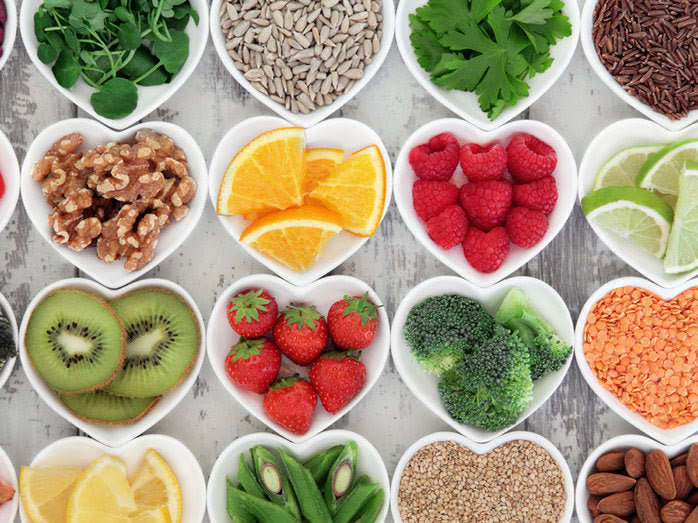Juicing is a quick and easy way to get the vitamins, minerals and nutrients from fresh fruits and vegetable without all the slicing, dicing, and chewing.
One thing my cousin Dejah is going to do, is buy a gadget. I had been silently pondering whether or not to invest in a juicer, when she walked in……..look at God! Sure, you can juice without a juicer (using a blender), but you will need to strain, (unless you do not mind the chunks).
Why Juice?
Getting your daily servings of fruits and vegetables can be difficult. There are only so many meals to be eaten, so many vegetables I want to actually eat, and only so many ways I know to prepare said vegetables (most of which, take the nutrients out completely). Juicing is an easy way to get your servings. Most days, I break my fast with a nice glass of fresh juiced juice… (or some sort of pastry …Donuts are my favorite….but this is healthier for you. lol).
Note: Juicing takes the fiber out of the fruits and vegetables. However, the body needs fiber to help control blood sugar, maintain healthy bowels, reduce risk of dying from heart disease and cancer. Be sure to find other sources for your daily fiber intake. And as always, be sure to speak to your doctor, know and understand your health, to assure any dietary or activity is safe and right for you.
What to juice?
You can juice just about anything. Juice the fruits and vegetables that you like. Or for me, I juice what I typically do not eat: ginger, beets, radish, turmeric.
Note: Avoid juicing anything with a low water content as these ingredients usually have a high fiber content and little to no liquid. As a rule of thumb, I try to juice more vegetables than fruit, which tends to have a higher sugar (albeit natural) content.
Be sure to wash all your fruits and vegetables before juicing. I usually soak them in an apple cider vinegar and water mixture for a few minutes, then rinse.
These are the go-to ingredients I typically juice for the house each week:
Ginger – Antioxidants and other nutrients in ginger root may help prevent or treat arthritis, inflammation, and various types of infection. Ginger can also help to relieve nausea and vomiting.
Beets – Beets may help to lower blood pressure, reduce LDL or “bad” cholesterol, reduce inflammation, improve brain function, improve stamina, help maintain a healthy weight, prevent or reduce fatty deposits from forming in your liver, and may have cancer fighting properties.
Turmeric – Helps fight infections and some cancers, reduce inflammation, and treat digestive problems.
Apple – “An apple a day keeps the doctor away.” Apple juice is high in Vitamin A and contains Vitamin C, which plays a role in growing and repairing tissues in the body. They contain antioxidants that protect against cancer, diabetes and heart disease.
Tomato – Rich in lycopene, a compound that’s been tied to a lower risk of prostate cancer, heart attack, and stroke.
Orange – Antioxidants found in oranges help to protect your vision and support your immune system.
Celery – Mostly water, thus great for hydration. Celery can also improve the look and feel of the skin, help stabilize your mood, and regulate blood pressure. It may also provide gut and digestive benefits, as well as have anti-Inflammatory effects.
Kale – Renowned superfood, kale strengthens immunity, supports heart and eye health, strengthens bones, and detoxifies the body.
Carrot – Drinking carrot juice is thought to boost immunity, help fight cancer, and improve eye and skin. health.
Cucumber – Made of a high content of water, cucumbers are great for hydration. Cucumbers may also help lower blood sugar and reduce inflammation.
Lime – Improve immunity, reduce heart disease risk factors, prevent kidney stones, aid iron absorption, and promote healthy skin.
Coconut water – Not juiced, but added for its taste, excellent source of hydration due to its high electrolyte, low calorie and low sugar content.
Note: If you can not drink it right away, store in a sealed container in the refrigerator for no more than 72 hours.
Juicing can be a delicious way to get vitamins, minerals, and nutrients, but it should not be your primary source of fruits and vegetables in your diet. Eating fruits and vegetables as close to their natural form as possible is always the healthiest choice.
BTW:The pulp can be used to enrich the soil and water for your home garden.
How do you get your daily dose of fruits and vegetables? What is your favorite fruit and vegetable? What is your favorite kitchen gadget?

